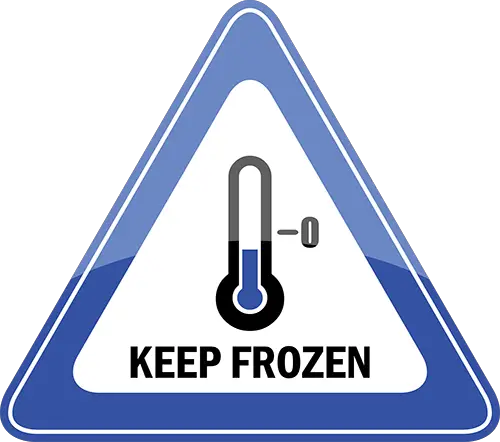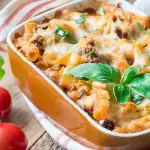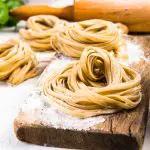Can You Freeze Noodles? (YES! Here’s How)
One of the most significant issues I face when making pasta is that I always make far too much for myself or my family to eat in one sitting. Since I don’t eat noodles every night, it winds up in a container in the refrigerator until they have long gone bad. Freezing noodles is the key to keeping them fresher longer.
You can freeze noodles by cooling them to room temperature and placing them in a freezer-safe resealable bag. Or, line a baking sheet with parchment paper and lay a single layer of pasta on the sheet to freeze. Once frozen, you can store the noodles in an airtight freezer bag or container.
In this article, I will explain how to freeze leftover noodles, how to properly freeze fresh uncooked pasta noodles, and how to thaw noodles so that they maintain their quality. I’ll also give some tips for freezing your favorite types of noodles. Let’s go!
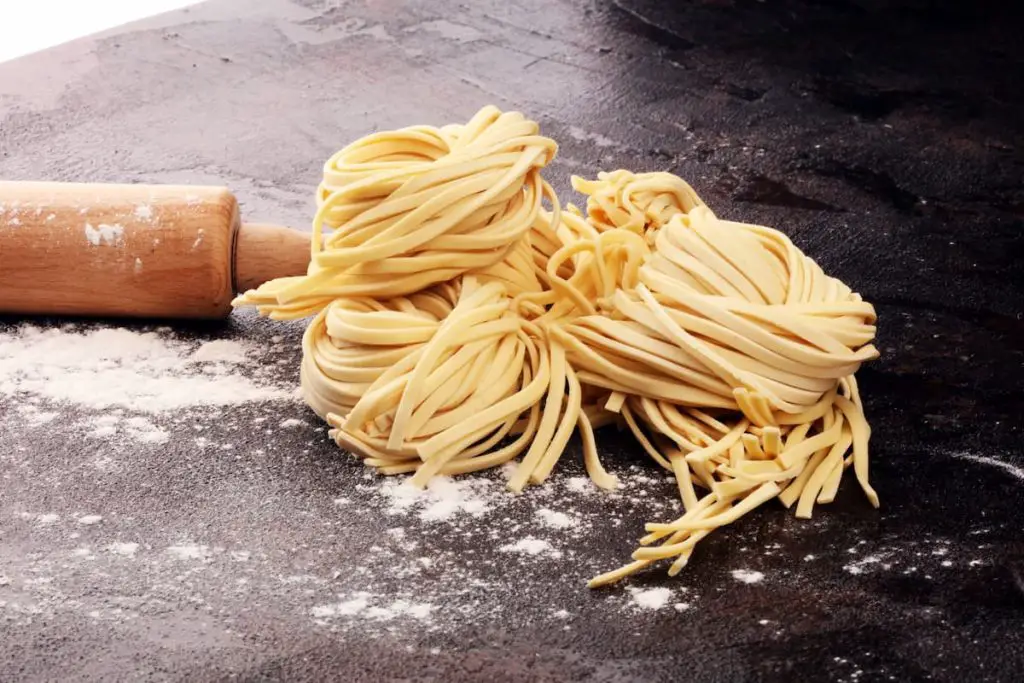
Freezing Leftover Noodles
As mentioned before, the most common problem with noodles is making too much for everyone to eat. It’s easy to overestimate dried spaghetti because it will increase in size as it boils. Throwing away leftover food feels like putting money down the drain.
For a simple way to freeze leftover noodles, follow these steps:
- Let the noodles cool to room temperature
- Line a baking sheet or cookie sheet with parchment paper
- Spread the pasta noodles over the sheet in a single layer
- Freeze the pasta noodles overnight
Once the noodles are fully frozen, you can put them in a freezer-safe container or a resealable bag such as a Ziploc Freezer Slider Bag which can be found on Amazon.com. Frozen leftover cooked pasta noodles will be safe in the freezer for up to 3 months.
Be sure to inspect the pasta for nasty smells or mold before reheating. If you notice a tear in the freezer bag or the container is not airtight, your frozen noodles can spoil or be subject to freezer burn.
Here are some tips for freezing your leftover noodles:
- Drizzle olive oil on your noodles before freezing. Olive oil will keep the noodles from sticking together.
- Portion out your noodles in separate freezer bags and date them. When you are ready to reheat it, you already have the perfect amount.
Refrigerating cooked pasta is an option if you plan to eat the leftovers within a day or two. If you are not going to get around to eating it that quickly, or if you are like me, it will end up moldy in the back of the refrigerator. Then, again if you are like me, you have to throw the whole Tupperware out rather than risk subjecting your nose to the smell.
Freezing Fresh (Uncooked) Noodles
I implore you to try fresh pasta at least once in your lifetime – it is a game-changer. Making fresh pasta can be time-consuming, and since you will be making it ahead of time for a family dinner or friendly get-together, you want it to be safely stored.
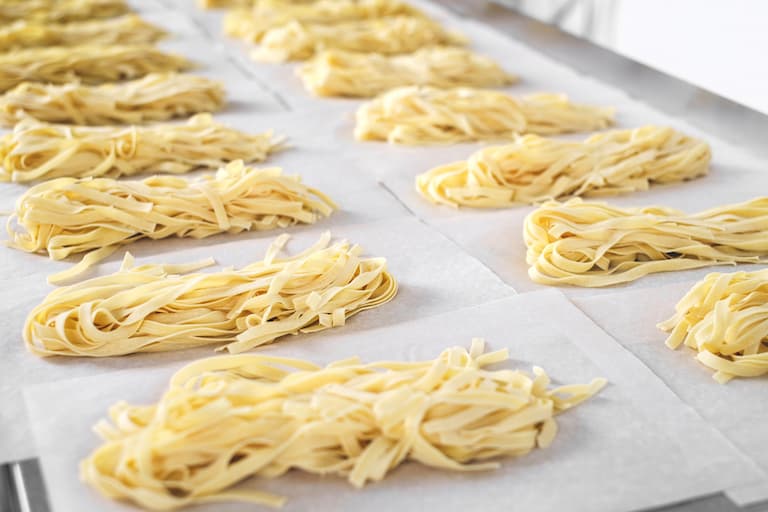
How To Freeze Fresh Pasta
Here’s how to freeze fresh pasta:
- Cut your pasta to the length and shape you want.
- Lay a single layer of the noodles on a baking sheet or parchment paper.
- Leave to dry in room air for about 15-20 minutes to reduce the amount of moisture in the noodle.
- Divide the portions and place your fresh pasta in freezer bags or airtight freezer-safe containers.
You can freeze fresh noodles for up to one month. Before cooking, be sure to inspect your noodles for any rancid spells or molded spots. You will be ready to dazzle your dinner guests with your fresh pasta every time!
Freezing Egg Noodles
Egg noodles can have a different texture and consistency than regular spaghetti noodles because they contain eggs. However, the freezing process is relatively similar.
An interesting difference between egg noodles and most store-bought noodles is that you can freeze egg noodles before or after cooking.
Before you cook them, you want to place them in a freezer-safe bag or container to keep them fresh for up to 5 months.
After you cook egg noodles, allow them to cool to room temperature for approximately 1 hour, and use olive oil to keep the pasta from sticking. Divide your egg noodles into portions, if you so choose, and seal them in freezer-safe bags or containers. Cooked egg noodles will last up to 3 months in the freezer if stored properly.
Freezing Ravioli
Plates of ravioli and filled pasta are delicious meals that can be labor-intensive to make. You can make a big batch of ravioli ahead of time and freeze them for a night when you are too busy to make such a dish but do not want to spend money eating takeout.
Flash freeze your filled pasta to keep them intact. Once you prepare the ravioli, place a single layer on a piece of parchment paper and place it in the freezer until they harden all the way through. Then, place the ravioli in a freezer bag or container for long-term storage in the freezer.
If you plan to make the pasta ahead of time instead of freezing leftovers, undercook the pasta just a tad (it’s called al dente). Then when you reheat the dish, it will not taste overcooked.
If properly frozen, ravioli and filled kinds of pasta will last up to 3 months.
Freezing Baked Spaghetti
Who doesn’t love a delicious baked ziti? Baked pasta dishes are dense, full of sauce and cheese, and are usually prepared in huge portions.
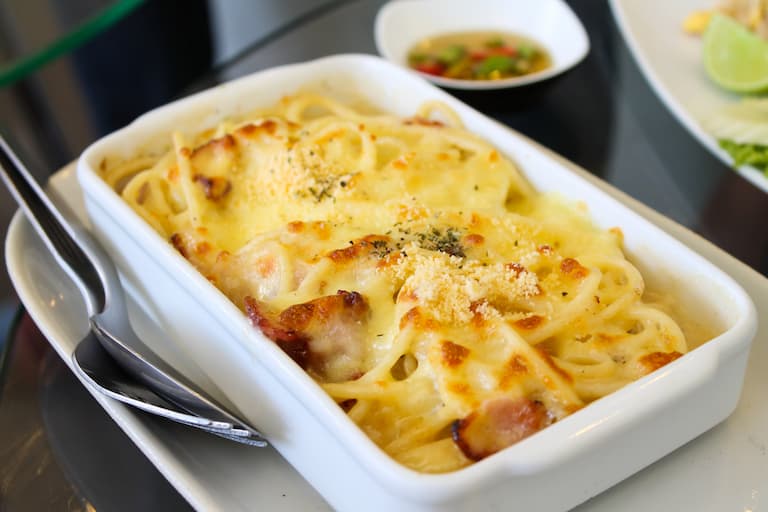
Here’s how to freeze baked spaghetti pasta:
- Separate the baked spaghetti dish into portions and let it cool
- Wrap the portions in aluminum foil first since you are also preserving the sauce and cheese
- Place the tin foil-wrapped servings of baked spaghetti in individual freezer bags and seal them before placing them in the freezer
Saving baked pasta in the refrigerator will only keep them safe for up to three days, but you can stretch that time out to 1 month in the freezer.
Thawing and Reheating Frozen Noodles
The big question: how do I reheat my frozen noodles, so they are as good as the first time?
The answer is to avoid the microwave. Some recipes say that defrosting in the microwave is acceptable, but the instant heat can cause the noodles to be mushy and unappetizing.
If you are reheating previously cooked pasta, you can put the bag of noodles in the refrigerator in the morning or thaw it in the bag in a bowl of cool water. To reheat, you can boil them in water for a few minutes to warm them up again or cook them a little more if you cooked them al dente the first time.
Thaw your frozen pasta in the refrigerator overnight for fresh pasta. To reheat, bring a pot of water to a boil and add your pasta or ravioli. Boil for 6-8 minutes or until they have reached your desired taste.
Remove frozen baked pasta from the freezer bag, but leave it in the tin foil. Bake the pasta in the oven at 350 ℉ (176.6 ℃) for 25 minutes. If you want the top of your pasta and cheese to be a bit crisper and meltier, unwrap the foil and broil on the top rack for the last two minutes. Place the foil-wrapped pasta on a baking sheet to avoid any spillover or mess.
Can You Freeze Noodles – Conclusion
Pasta noodles are a staple in many households. Freezing your noodles is the best way to keep them fresh for long-term storage. Cooked noodles and egg noodles are easy to preserve for future meals for up to 3 months.
Baked pasta and freshly made pasta freeze well and store for up to 1 month. Simple thawing and reheating of frozen noodles will have you and your family eating well at home in a short amount of time without the costly expense of ordering out.
I love the ease of freezing and reheating meals without sacrificing the taste, and I bet you do too!
